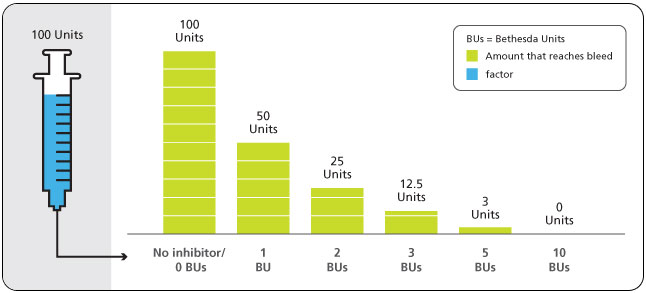Discovering inhibitors
Inhibitors do not exist at birth. They can only develop after the person with hemophilia has received replacement factor. Most of the time this happens within the first 50-75 injections. Inhibitors may even appear after years of treatment, but this is rare.
It also may occur in adults with mild or moderate hemophilia that receive factor VIII or IX for the first time. This occurs when they need surgery or have an injury with bleeding.
In order to identify an inhibitor, it’s important to know if you’re at risk and familiarize yourself with the common signs.
Who develops inhibitors?
Your chances of getting an inhibitor depend on many things. This includes the type of hemophilia (A or B) and severity of your hemophilia (ie, mild, moderate, severe), your family history, and race. Hemophilia with inhibitors is also more common in people with hemophilia A (20%-30%) than hemophilia B (up to 6%). People with severe hemophilia are more likely to get inhibitors than those with mild hemophilia because their bodies make less factor VIII or IX.
Having a family history of inhibitors could mean you are more likely to develop them. People of African or Hispanic descent are also at greater risk. Sometimes they may have a slightly different factor VIII than what is in replacement factor.
Your chances of getting an inhibitor also depend on the treatment you receive, and when you receive it. Your hemophilia treatment center (HTC) may want to check on your factor VIII or IX gene to see what type of gene abnormality you have. This blood test is called genotyping. It may help find out if you have a higher risk. You can then try to individualize your treatment.
What are the signs of inhibitors?
If you are treating a bleed and notice:
- Treatment is taking longer than usual
- Treatment is not working
- You need higher doses of factor or more infusions
All of these may be signs of an inhibitor.
You should contact your HTC to schedule a blood test if you suspect you or your child have inhibitors.
Expand




